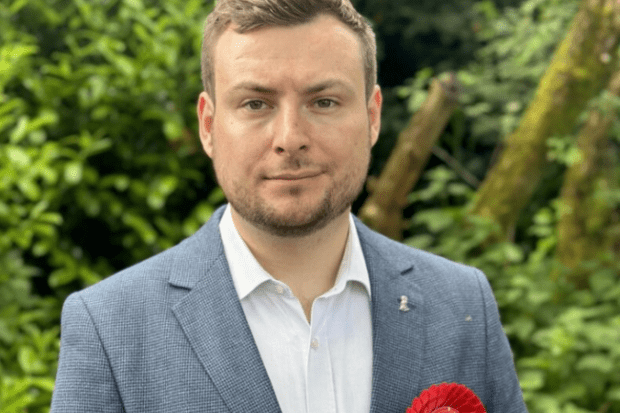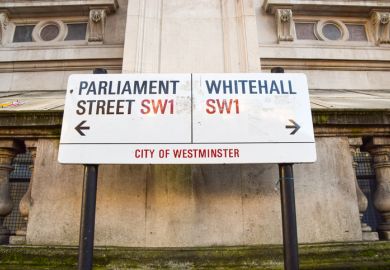Asked how his deep knowledge of Aristotle might prepare him for life in parliament, Peter Swallow was always quick to remind voters that one of Britain’s most effective politicians was a classicist.
“I like to say I will model myself on a great leader who led his nation through the pandemic with distinction – that is Mark Drakeford, the former first minister of Wales, who has a degree in Latin from the University of Kent,” quipped Dr Swallow, who, prior to being elected as Bracknell’s first-ever Labour MP last month, was a Leverhulme research fellow at Durham University.
The 30-year-old’s arrival at Westminster – taking a seat won by the Tories since its creation by just 784 votes – will certainly bring a certain classical heft to the Commons that many felt Britain’s most famous Homer-quoting politician lacked.
“Whenever Boris Johnson quoted the Iliad in Greek, he would start in one section but move into a completely different part, which suggested he didn’t understand what he was saying,” observed Dr Swallow, who took a PhD on Aristophanes at King’s College London in 2020.
But while Dr Swallow’s academic credentials are perhaps a cut above the former prime minister’s, he is certainly not the only new parliamentarian with significant higher education experience. According to one count, there are now a record 27 MPs with PhDs sitting on the green benches, including several mathematicians, a couple of materials scientists and a bevy of political scientists.
Those joining directly from academia include University of Essex professor Pam Cox, Colchester’s first Labour MP since 1945; geopolitics lecturer Al Pinkerton from Royal Holloway, University of London, who captured Michael Gove’s old seat of Surrey Heath for the Liberal Democrats; and University of Southampton linguistics lecturer Darren Paffey, who took the key battleground seat of Southampton Itchen for Labour.
With many of these MPs elected on small majorities, it is perhaps naive to think they will end up devoting themselves to solving higher education’s funding woes above the other interests of their constituencies.
However, their presence could make a difference about how higher education is discussed in parliament and beyond, according to Dr Swallow.
“It won’t be the biggest issue as I campaign as an MP, but it will be important that we don’t have subjects like mine being reserved for just some young people, and I will speak out about this,” he said.
While Labour’s limited announcements on higher education since the election might have disappointed some, Dr Swallow insisted that the change in tone since Rishi Sunak was attacking “rip-off degrees” was hugely significant. “We’re not going to be going after courses just because of a perception that they are lesser – we need to recognise the value of subjects in the arts and humanities, and expanding access to Classics will be part of that,” he said, noting how a new review to ensure that school curricula are not too narrow was evidence of Labour’s intent.
And any perception that Labour is ducking a difficult decision on unfreezing tuition fees in England is also wrong, added Dr Swallow.
“It’s important to recognise the really difficult financial situation that this government has inherited – there isn’t unlimited money to fix things, and we’re honest about those difficult choices that we face. But university finances do need to be looked at,” he said.
“We also can’t ignore student finance because it’s one of the most regressive forms of taxation that it is possible to design – that needs to be fair,” said Dr Swallow, adding that he would “use my experience to support and challenge government to get the best outcomes possible”.
Another MP arriving from academia is Ellie Chowns, a lecturer in international development at the University of Birmingham who took North Herefordshire – a Tory safe seat for decades – for the Green Party with a majority of almost 6,000 votes, following an incredible 32 per cent swing.
As one of four Green MPs, Dr Chowns will hold the party’s education brief, but was frank about other issues taking precedence. “I was really clear about my three priorities: renewing our economy, housing and restoring our rivers,” she explained. “I’m here to speak out for my constituents, not just for a group of universities where I used to work.
“I’m happy to make the argument for their importance to the economy and society, but I do feel that we have an excessively narrow view of what higher education looks like – I’d like to see more lifelong learning and more efforts to help people above the age of 18 into different pathways, like degree apprenticeships,” said Dr Chowns, who also noted the Greens’ long-time opposition to tuition fees.
“Students are paying through the nose, so we need a debate about that too,” she said.
Register to continue
Why register?
- Registration is free and only takes a moment
- Once registered, you can read 3 articles a month
- Sign up for our newsletter
Subscribe
Or subscribe for unlimited access to:
- Unlimited access to news, views, insights & reviews
- Digital editions
- Digital access to THE’s university and college rankings analysis
Already registered or a current subscriber?








